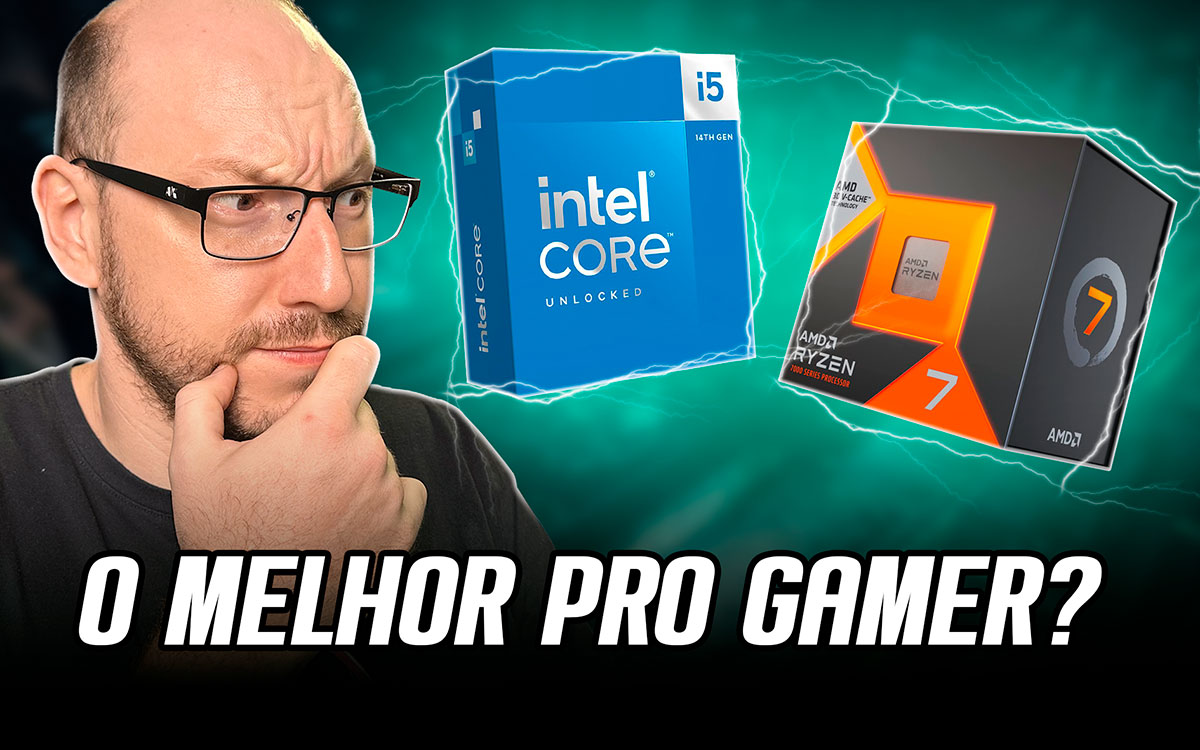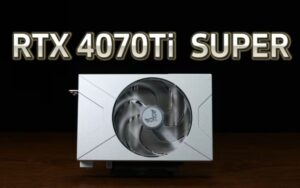
This article is a response to an article that was published on XDA. The “4 reasons Intel is better than AMD for the average gamer“, or translated into Portuguese, “4 reasons why Intel is better than AMD for the average gamer”, gave me a “cringe” that I haven’t felt in a while.
The biggest problem with the article is that it relies on the mysterious entity “average gamer”. I haven’t seen anyone go through this shame since the Hardware Unboxed vs Nvidia bullshit. To briefly recap, an Nvidia representative used the argument that the HU methodology was bad because “you don’t see things the way we, the gamers, and the rest of the industry do”. This would justify a boycott of Hardware Unboxed, which would no longer receive GeForces for testing.
Me, the gamers
There is little that is more flawed than an argument from someone who thinks he is the representative of a community, and thinks he can speak for all of them. At that time, the Nvidia executive was stating that the community was excited about Ray Tracing and that focusing on rasterization, as HU did, was meeting what the community wanted.
What bothers me is the petulance of claiming to be the voice of a group. It’s not the kind of responsibility you cry out for, it’s the kind of responsibility you’re invested in. And the years of producing content and interacting with the gaming public left me with a clear vision that one characteristic of gamers, especially PC gamers, is the lack of uniformity.
Tastes go everywhere, with preferences of all kinds. And budgets vary greatly, from those who can choose whatever they want to those who have virtually no choice. Saying “the gamer is X” is reductionism doomed to failure.
But back to the article in question. He raises four things that are difficult to verify, after all the source is “trust gamers are like that”. I’m going to use the best tool I have at hand to try to see if these statements resonate with Adrena’s audience: the YouTube poll.
The polls there easily receive thousands of responses, so this gives us a sample of how much the statement in the XDA article represents our community on the Google service.
We will also bring our impressions, with our testing history, on each topic. So let’s take one topic at a time!
4. Faster memories matter
Memory speeds impact performance in games, and we have already tested this here at Adrena in depth in the past. However, this impact is limited for three reasons.
The first is that the gains become smaller and smaller as we use more and faster memories. Bottlenecks in other components become more relevant, and continuing to increase memory “indefinitely” makes these gains less and less important.

And continuing to raise frequencies and reduce memory timing causes two other effects: the second is that the cost goes up too much, as very fast memories require a very selective process of binning. The third is that the faster the memories, the more difficult it is to stabilize the system.
And that’s the point of the article, arguing that Intel stabilizes more easily in faster memories. In our experience, yes, Intel and its current products are easier to achieve the higher frequencies compared to current Ryzen’s AM5-based systems. But with limited gains and rising costs, it doesn’t make much sense to abuse high speeds.
And what does our audience think?

More than half were in the intermediate position. 51% consider that the balance between speed, stability and cost is the best option. And so we have the first argument of the XDA article looking flawed, at least considering the opinion of those who voted in the poll.
3. Energy efficiency is something gamers don’t care about
Who cares about FPS per watt? The argument of the article is that efficiency has a greater impact on applications that use multithreading, something that does not affect games as much. Therefore, games should neither consume nor heat up too much on most machines.
So consumption must be something that gamers ignore, and heating is something outside of their concern. It will be?

This was a topic that divided people a lot. Basically we have a third who consider it a relevant factor, with another third not “giving a damn” about it because they are only looking for performance. Bringing together the spectrums of “I care” and “I don’t care”, we have the votes almost split at 50% vs 50%.
Here it is interesting to see that the public is not so concerned with consumption itself, but with the other currency of consumption: heating. As Antônio Pikachu, who lives in Piauí, said, lower TDP, in addition to making it easier to save on power and cooling, is crucial for him to be able to handle the heat in his region.
And we agree with him, and we have seen this excessive heating of the most modern processors with a bad eye. The Intel Core and its Power Levels (PL) controversy that we will debate in the future, and even our preference for ECO mode on the AMD Ryzen 7000 shows how negative we consider this situation.
But I also understand the point of view of enthusiasts who are looking for maximum performance. As Artur Vainer commented, “The only channel for those who pretend to be enthusiasts to feel safe and welcomed”, and here it is a channel that also seeks to serve hardware enthusiasts and who want to see the limits of technology, without caring too much about the bill of light or the size of the cooler. And this profile is relevant in the community around Adrena.

So the XDA article got it right? The answer is no. He does talk about a relevant group of the gaming community, but he doesn’t represent the other half, so saying that they don’t care about it is an exaggeration.
2. Intel has the best cheap processors
This one, I already knew what people were going to answer before even registering the poll. But it is worth highlighting that what is cheap for foreigners is different from the concept of cheap for us, in the Latin American neighborhood.

He calls the Intel Core i5-13600K and the AMD Ryzen 5 7600 cheap, while our 2024 processor guide, which we launched this weekend, also talked about two price levels below these guys!
Our cheap ones are people like the AMD Ryzen 5 5500, or the Intel Core i3-13100F, models that foreign gamers don’t even consider for a gaming machine. And we also think that you should spend more, but the reality of the budget of the average Brazilian doesn’t help you dream so big.
So, what did everyone think of this statement that Intel has the best low-cost processors?

AMD messed with this option, and not even the diplomatic “both brands have good options” helped much. When gamers are short on money, AMD Ryzen is the way to go. And as we already saw in our sales report, AMD Ryzen 5 5500 really is king here.
And to close, this is a very interesting discussion, and one that the author on XDA placed as the most relevant. Does buying a mainboard and a processor thinking about changing them make any sense?

The overwhelming majority (88%) considered it relevant. And yes, being able to buy a new processor in a while and upgrade your bench is cool, but at the same time, does it make sense to think about a PC that you already want to change “soon in the future”?
After a few years, it seems to make more sense to update the bench as a whole, for some, and even the two most liked comments in the poll reflect these two views well.

In our opinion, both strategies are valid. It makes sense to take the beginning of a platform like the AM4 or AM5 and, after a few years, switch to the latest processor compatible with that socket. But completely replacing your PC, taking the opportunity to update all the other components involved (USB technologies, DDR version of memories, among others) is also a good way to stay up to date with the latest computing resources.
But to make a verdict, the XDA article was wrong again. At least considering Adrena’s audience, people do care about the platform’s longevity.
We have reached the end of the polls and article topics. The publication manages to get all its generic statements about gamers wrong, trying to put everyone in “one basket”.
The gaming community is very diverse, and the PC Gamer community is even more diverse. It is a group that is not satisfied with uniformity, so much so that they assemble their machines the way they want – or with the money they have.
So it’s difficult to go around making statements about what matters or doesn’t matter to gamers, or what they want or don’t want. That’s why we always try to provide multiple options in our recommendations.
After all, there are those who focus on performance regardless of consumption, but there are also those who want a more efficient product. And there will also be strong options among Intel processors, but it’s worth keeping an eye on that there are a lot of AMD Ryzen that are worth paying attention to.
Source: https://www.adrenaline.com.br/colunas/voces-acham-que-a-intel-e-melhor-que-amd-para-o-gamer-medio/


